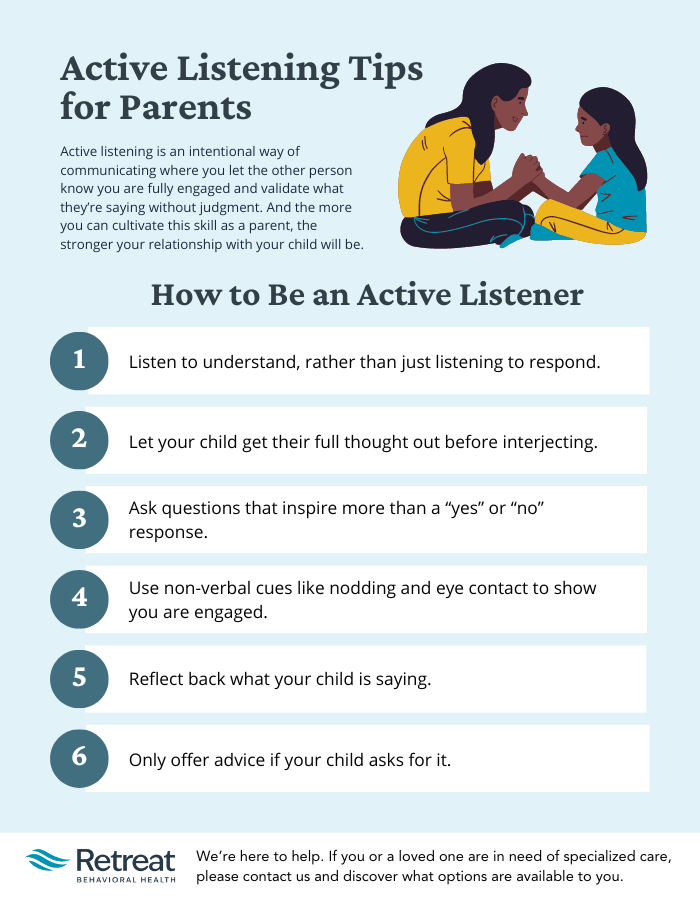A good first-step to bettering a parent-child relationship is to begin the practice of active listening.
Being a parent is tough work, but so is being a kid. And the more parents can do to facilitate open and honest communication between them and their children, the stronger the home dynamic will be. That’s good news for both parties, especially when it comes to navigating the everyday trials and tribulations that come with adolescence.
Below, we’re exploring the many benefits of active listening, with helpful tips that parents can start doing right now to promote healthier communication in their homes.
What Is Active Listening?
Active listening is a way of communicating with others where you let them know you are an engaged participant in the conversation.
Various techniques associated with this communication skill include giving your full attention to the person talking, reflecting back on what they’re saying, and listening without judgment.
For parents in particular, active listening means providing kids with a safe space to open up about their feelings, thoughts, and experiences. In doing so, they let their child know that what they say matters – and that they always have someone they can come to with problems or questions.
Benefits of Using These Techniques with Kids
At the foundation of a good parent-child relationship is healthy boundaries and communication. Actively listening achieves these and more, and can serve to strengthen the bond between a parent and child while also giving that child the encouragement to speak their mind.
More than anything, listening with intent lets a child know that what they say has value. It’s a way for parents to show appreciation for a child who is willing to come to them with personal issues, and to ensure they feel heard and validated. The key to this is listening without judgment, repeating words back instead of putting a judgmental spin on them – for example: “You told your teacher you weren’t happy with their directions” instead of “You talked back to your teacher.”
Active Listening Tips for Parents
Listening with intent is a skill like any other. Here’s how to cultivate it for the benefit of your child and your home:
- Get on your child’s level and maintain eye contact
- Use non-verbal cues to let your child know you’re listening, such as nodding
- Reflect back what your child is telling you
- Ask questions that require more than a “yes” or “no” response
- Resist the urge to give advice unless your child asks for it
- Control your facial expressions and try to remain calm, neutral, and caring
- Watch your body language and make sure your posture is open and welcoming
Of course, you might not get it all right all of the time. And that’s okay! What’s important is that you make a real effort to actively listen to your child, and that you learn from your mistakes and are willing to acknowledge when you could have done things better.
Keep in mind that while these techniques are useful for communicating with your kids, they can also be used in other situations to facilitate better engagement and relationships. Try practicing the tips above when talking to your partner, as well as at work and in other social situations. You might just find that there are a lot fewer miscommunications in your day.

Want to Learn More?
Listening actively is something that all parents can do to strengthen their relationship with their kids. Whether your child is just starting to communicate or is well into their teen or young adult years, actively listen to let them know that they always have someone they can talk to.
For additional resources, we invite you to explore the Retreat Family website, where you’ll find more advice and other useful content. We also offer resources for family members and loved ones of individuals with substance use disorder, and can help you get the support that your family needs.
